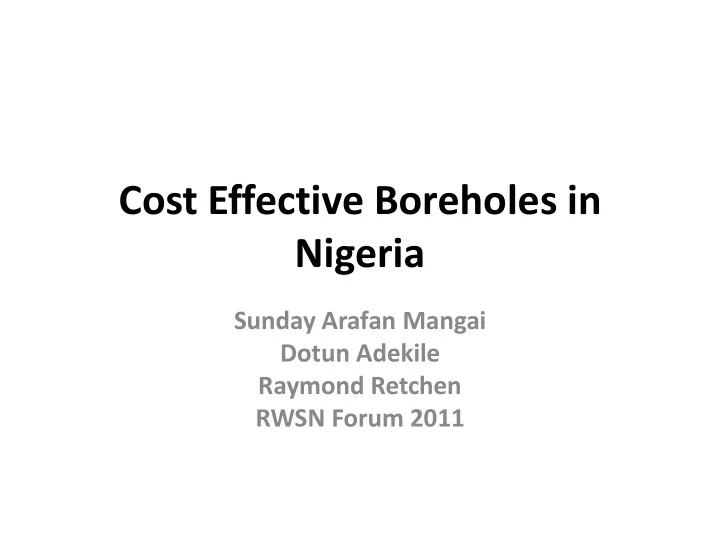

Cost Effective Boreholes in Nigeria Sunday Arafan Mangai Dotun Adekile Raymond Retchen RWSN Forum 2011
RWSN Code of Practice for Cost Effective Boreholes • Enables organizations to evaluate their approach to borehole delivery in accordance with best international practices
Nigeria -Background • Population: 150 million • Federal Constitution with 36 states • Rural Water Supply Coverage: c. 40% • Drilling started in 1947
Principle 1: Borehole drilling and supervision should be undertaken by professional and competent organisations • Drilling companies in Nigeria – mostly Nigerian • Water Well Drillers Association founded in 2009 – a directory of 350 members • Conventional drillers – machine drilling • Artisan drillers – hand drilling, locally made rigs • Brief case drillers • National Code of Practice for Water Well Construction in Nigeria (FGN/NWRI, 2009 ).
Principle 2: Appropriate siting practices utilised competently and scientifically performed • All government contracts stipulate geophysical surveys – resistivity and electromagnetic methodologies • Siting by trained geologists • Siting by trained technicians – regulation by the Council of Nigerian Mining Engineers and Geoscientists (COMEG) • Siting by drilling contractors
Principle 3: The construction method is economical, drilling technology matches the borehole design • Previously multi purpose heavy duty rigs used, current trend is towards fitting the rig to the purpose • Locally fabricated rigs – Recent survey shows 30% of rigs fabricated locally • Hand drilling • Private businesses & householders able to own their own boreholes
Principle 4: Procurement procedures ensure that contracts are awarded to experienced and qualified consultants and drilling contractors Public Procurement Act of 2007 • projects advertised • requests for expressions of interest • prequalification of contractors • verification of prequalification submission • short-listing of contractors • submission and evaluation of tenders • contract award
Principle 4: Procurement procedures ensure that contracts are awarded to experienced and qualified consultants and drilling contractors Prequalification requirements • of past contracts of similar nature • cost and complexity • personnel capabilities • equipment capabilities • financial capability • litigation history
Principle 5: The design is cost-effective, to last for a lifespan of 20 to 50 years, and minimum specification to provide a borehole which is fit for purpose Borehole designs fit the terrain and the purpose Open holes Different borehole designs Aquifer type Design 110 mm dia. PVC lined max. 60 m Weathered basement complex and depth fitted with a handpump shallow sediments; depth less than 60 m Sediments with aquifer at depths greater 150 mm dia. PVC lined to 100 m depth than 60m fitted with a handpump Sediments with aquifers greater than 150 mm dia. Steel lining fitted with motorised pump 100 m
Principle 6: Adequate arrangements are in place to ensure proper contract management, supervision and timely payment of the drilling contractor Contract management and payment • Based on well established government systems - technical specifications and bill of quantities • Payment within 60 days – not quite Supervision - weak • the ‘’no water no pay’’ policy • most projects do not budget for supervision • lack of experienced personnel to carry out the supervision
Principle 7: Hydrogeological and borehole construction data are collected in a standard format and submitted to the relevant Government authority • Geological Survey department – Form GS 10 • National Code of Practice for Water Well Construction in Nigeria • National Water Resources Institute • No water no pay
Principle 8: Storage of hydrogeological data is undertaken by a central government institution with records updated and information made freely available and used in subsequent drilling specifications. • National Code of Practice for Water Well Construction in Nigeria • NWRI
Principle 9: Monitoring - Regular visits to completed boreholes are made to monitor their functionality in the medium as well as long term with the findings published • National Rural Water Supply and Sanitation Program Strategic Framework • Local governments and State rural water supply agencies responsible for monitoring of facilities • 30 - 60% handpumps not functional • ESA & NGOs support communities
Conclusion Strengths Systems and the legal framework for CEB have been set up • Procurement act • National Code of Practice for Water well Construction • Water Well Drillers Association Weaknesses • Lack of transparency in contract award • Late payment • Data collection • Non payment for dry holes • Poor supervision
THANK YOU
Recommend
More recommend